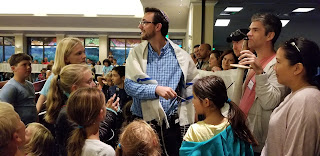As you know, for the last few sessions, we have been building our knowledge of the history, culture, language and music of the Ashkenazi Jews.
We started out by expanding our vocabulary and learning all about the history of the Ashkenazim, and how they migrated from what is now Israel to the Rhine Valley, and eventually to Eastern Europe. (Yes, many came to America next, but we will learn about that in the next unit!)
To show what they learned about this history, the students wrote a rap song, which we will be recording next Tuesday and Wednesday. In the meantime, here are the lyrics and the instrumental track to practice with.
THE ASHKENAZI RAP
THE ASHKENAZI RAP
(Nina, Max)
This is a story about Ashkenazim
It’s much longer than it may seem
And I’d like to take a minute,
it’s not a pain
It’s I how we became Jews
Of a place called Ukraine
(Refi, Talia, Livia, Aliyah)
In old Jerusalem, born and raised
I was Ashkenazi and no fake
Speaking Hebrew on my Holy Days
And enjoying living in our Holy Place
But those pesky Romans were up to no good,
Started making trouble in my neighborhood.
Their anti-semitism sent us away
So we packed our bags to live another day.
I begged and pleaded with the Parnasim,
But they said, “Go pack your bags and be Sephardim!”
You will leave Rhineland and go to Spain!”
But that would have been a really big pain!
WEDNESDAY
(Camille, Anna, Avi, Gavin)
The Crusades, yo, this is bad
The Christian armies were not so rad
Is this what the Jews of Rhineland live like?
Hmmm…This will never be alright!
(Isabelle, Riley, Sofia)
We came across some trouble in the town of Speyer
They attacked all the Jews and lit houses on fire.
The bishop in the town gave us refuge
He saved a lot of lives and none refused.
We pulled into Ukraine round 1408
Where we joined other Jews that were forced to migrate.
We looked around, we were finally there!
Living in our new homes with no despair!
(Kayla, Jordan)
To be a moneylender was one of our jobs.
We lived in the shtetl to keep away from mobs.
We just wanted to get along
We were here to live our lives and sing Yiddish songs.
HERE IS A LINK TO THE VIDEOS FOR THE TRACK (FRESH PRINCE OF BEL AIR THEME SONG), BOTH WITH THE ORIGINAL WORDS AND INSTRUMENTAL ONLY:
With original lyrics
With original lyrics
Instrumental












































